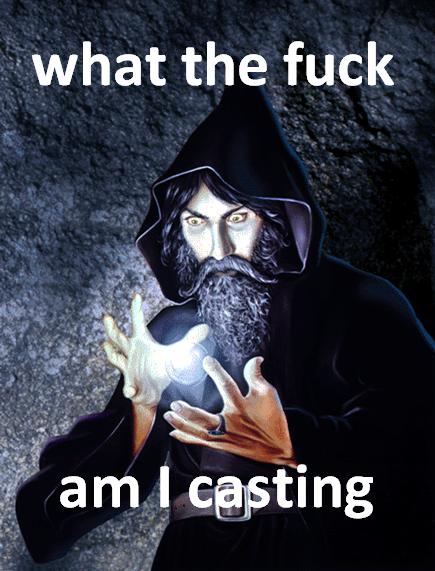I hate Vancian magic.
The magic system in Dungeons & Dragons is influenced by Jack Vance’s Dying Earth series (did you know that the name of the famous D&D lich, Vecna, is an anagram of Vance). It’s the “fire and forget” system. It’s stupid:
- It makes wizards—I hate the old-school term magic-user— ridiculously weak at low levels. You cast magic missile, and then you are useless until you rest to re-memorize a low-level spell that you’ve probably cast several times before. Later editions attempted to address this via cantrips, but I don’t think they’re the best solution.
- Wizards at high levels are way too powerful, but I don’t like D&D’s typical balance-by-subtraction at low levels method.
- The whole concept of a spell being wiped from the wizard’s memory after casting is silly, but spell points are equally silly.
- Having to prepare spells in advance makes it a guessing game. The party’s thief dies, but you failed to memorize the knock spell? Too bad. Later editions’ use of spell slots is too metagamey and dissociated for my taste.
- Limits on casting based on spell level—how many you can memorize and how often you can cast them—seem silly have no real in-game justification.
- Other classes have to roll in order to do things, but wizards often don’t when they cast spells. Similarly, targets of spells often get a saving throw, but targets of melee or missile weapons don’t (as a side rant, this is a contradiction that proponents of a “unified mechanic” tend to ignore). Later editions muddy the waters with some spells requiring a roll vs. AC and some granting a saving throw to the target.
So what I want to do is to design a system that has the following characteristics:
- Wizards must always perform some sort of roll in order to cast. Failure would represent either the wizard failing to properly remember the spell or failing to control or focus its arcane energy. Alternatively, such effects only occur on a critical failure, and the spell caster is rolling against some sort of target value that is similar to AC.
- There should be some sort of mechanic for spell fizzle or miscasting.
- There are no explicit casting restrictions based on level.
- Higher level spells have a greater base chance of failure and negative consequences.
- Chances of spell failure (and perhaps its consequences) decrease as wizards gain levels.
- There are no saving throws; a different mechanic will be used.
- Perhaps include some model of cumulative fatigue from spell casting.
- Perhaps include some sort of counterspell mechanic other than a lame counterspell spell.
- Extremely powerful spells will be lengthy and potentially dangerous rituals.
Later posts will cover these in detail.
